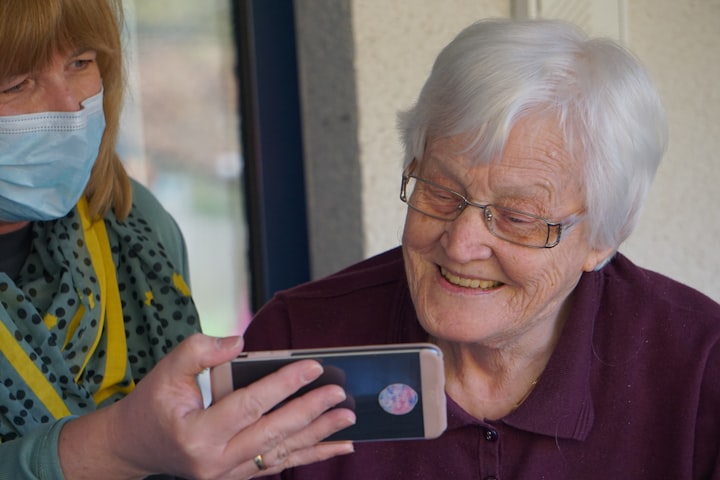Celebrating the Impact of Technology...
on Carers in Lockdown

Since March, when lockdown was initially announced, carers have been under immense pressure due to spending more time than ever at home. There are many of us out there who do not consider ourselves carers, thinking of it as perhaps a profession or something you’re paid to do. According to statistics, it can It can take some carers longer than five years to realise that they’re actually playing this important role.
Here, following another introduction of strict rules as we make our way into 2021, we’ll take a look at how carers have taught people who they care for to use tech during lockdown.
A helping hand
Carers typically care for people who are:
• frail
• have a disability or special needs
• have a chronic illness
• have a mental illness
• have dementia/Alzheimer’s
• have a substance misuse problem with drugs or alcohol
You can form a support bubble with another household of any size if you live alone, even if you have carers coming into your home, or have a child with a disability. Although this support bubble was created to prevent people feeling lonely and abandoned, some individuals may be especially vulnerable to the virus and will need to totally self-isolate.
This means in-person visits may need to be suspended, especially since a new coronavirus strain that has higher transmission rates has started impacting the nation. Recent research reported that one in four adults have felt lonely during lockdown as well as over 1.4 million elderly people, which has unfortunate impacts on their mental health. For some, carers might be the only people who they see in person on a regular basis.
How technology has helped
Technology has played a key role during lockdown, not just for remote office workers, but for carers who have an obligation to ensure someone is happy. Online communication has allowed people to socialise online with ease, adapting to a new way of life for providing emotional and social support while keeping independent, safe, and involved. Facilitating relationships digitally and caring remotely has opened up a new type of care, as well as allowing carers to have some well-deserved respite and personal time during a strange and unprecedented time.
Anne Barnes, from Kings Heath in Birmingham, is a full-time carer to her 21-year-old son Andrew, and says she has a number of friends who also have caring responsibilities and have been struggling.
“Lockdown has meant many of my friends are missing accessing the services they had become accustomed to receiving.
“For some, being a lone carer has been a very isolating experience and particularly parents of children with high support needs, that are not currently at school, have struggled. The loneliness battle has been extremely challenging for some people and it’s possibly an even greater fight than Covid-19 itself for those who are doing this alone.
“Having a reliable support network is incredibly important. Both myself and my husband have been OK as we’re quite resilient. But for others who have been struggling I would say it’s ok to feel overwhelmed at the moment, but you’re not alone. Reach out for help when needed because there are still services available and people out there who are willing to listen.”
Through lockdown, Anne, and many carers like her, have maintained contact with her carer friends via Zoom where they support each other and share their experiences.
Zoom
Partaking in online video or phone calls with those in need in lockdown will help show support to many vulnerable individuals — 300 million daily meetings took place during lockdown in April, demonstrating how effective it can be. Zoom is an online application that can be used on different devices to engage in virtual meetings either with webcam or just audio. Multiple attendees can join the meeting, and the technology has gained huge traction recently as relationships have been facilitated online to stay in touch with loved ones, adding more intimacy than a traditional phone call.
This can help both carers and those they care for keep in contact and it allows other carers who may be stuck in the house and feeling overwhelmed to speak with others like Anne.
Health tech
It may be difficult for people with physical or mental disabilities that hinder them seeking medical advice in-person, however everyone should access medical assistance remotely, wherever possible. Apps like myGP allow those who rely on carers to book online doctor’s appointments where they can speak directly to a health practitioner over their device, obtain prescriptions, and view medical records. Specialist services for mental health can also be accessed, making this sort of technology a win for those who cannot leave their house for support.
Technology has certainly improved the quality of support that carers have been able to offer patients during lockdown, particularly with online communication and GP services. We expect to see technology remain as important in the future, even after the pandemic, do you?
About the Creator
Amy Mercer
Artist & Content Strategist






Comments
There are no comments for this story
Be the first to respond and start the conversation.